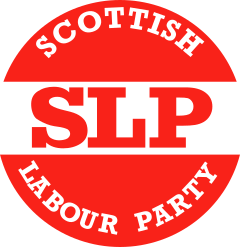Scottish Labour Party (1976) facts for kids
Quick facts for kids
Scottish Labour Party
|
|
|---|---|
 |
|
| Leader | Jim Sillars |
| Founder | Jim Sillars John Robertson Alex Neil |
| Founded | 18 January 1976 |
| Dissolved | 1981 |
| Split from | Labour Party |
| Merged into | Scottish National Party |
| Newspaper | Forward Scotland |
| Ideology | Scottish nationalism Democratic socialism |
| Political position | Left-wing |
The Scottish Labour Party (SLP) was a political group in Scotland. It was active from 1976 to 1981. This party broke away from the main Labour Party in the UK. The SLP won three local council seats in 1977. However, its Members of Parliament (MPs) lost their seats in the 1979 election. The party then closed down two years later.
The Story of the Scottish Labour Party
The Scottish Labour Party started on January 18, 1976. It was formed by members who left the main UK Labour Party. These members were unhappy because the Labour government at the time had not created a special Scottish Assembly. This assembly would have given Scotland more power to make its own decisions. They also disagreed with the government's plans for society and the economy.
Three main people led the creation of the SLP. They were Jim Sillars, who was an MP for South Ayrshire. Also, John Robertson, an MP for Paisley, and Alex Neil, a top researcher for the Labour Party in Scotland. This split happened just before Harold Wilson stepped down as Prime Minister.
Soon after the party formed, a survey showed it was quite popular. It was taking a quarter of the support that the main Labour Party usually had in Scotland. The survey also showed the SLP had more support (8%) than the older Liberal Party (6%). Alex Neil was very happy about this. He thought the SLP could win in poorer areas of west Scotland.
Some other political groups tried to join the SLP to push their own ideas. One group was called the International Marxist Group (IMG). At the SLP's first big meeting in October 1976, the IMG was asked to leave. Some other local groups were also removed. A historian named Henry Drucker said that Jim Sillars used this as a reason to remove anyone he disagreed with. Those who were removed formed their own group.
The SLP did not win many elections. They only won three local council seats in the 1977 local elections. In the Garscadden by-election in 1978, they only got 583 votes. In the 1979 general election, the SLP ran candidates in three areas. Jim Sillars tried to win his seat again. He almost did, but this was mostly because people liked him personally. The other two candidates did not get many votes at all.
Because they didn't win, the SLP decided to close down in 1981. Many members stopped being active in politics. Some went back to the main Labour Party. Others joined the Scottish National Party (SNP). Both Jim Sillars and Alex Neil joined the SNP. They both became important leaders there.
People often see the SLP as a brave try that didn't work out. Jim Sillars himself said they didn't plan enough before starting the party. He said the SLP did help the SNP later on. It showed the SNP how to talk to people with left-wing ideas.
Who Were Its Members?
At first, the SLP leaders said they had 2,000 to 3,000 members. But later, it was thought that the highest number of members was 883 in October 1976. This was the same month the party split. A large number of these members (276) were from Jim Sillars's home area of Ayrshire. This meant that small villages in Ayrshire had more members than big cities like Aberdeen.
However, the SLP did have many dedicated people. Some of them later became well-known politicians. These included John McAllion, who became an MP and then an MSP. Also, Maria Fyfe, who was an MP, and Sheila Gilmore, another MP. Charlie Gordon became a leader of Glasgow City Council. These people mostly rejoined the main Labour Party. They did not follow Jim Sillars to the SNP.
Other notable members of the SLP included:
- Neal Ascherson
- Chris Bambery
- Colin Boyd, Baron Boyd of Duncansby
- George Kerevan
- Tom Nairn
- Danus Skene
Neal Ascherson was a political writer for The Scotsman. He was one of many journalists who joined the SLP. This was unusual for a political party. Other important journalists who were members included Bob Brown from The Times. Also, Stewart MacLachlan and Ruth Wishart from the Daily Record. James Fyfe from the Glasgow Herald and James Frame from the Edinburgh Evening News also joined.
Election Results
| Election | Votes | Vote % | Seats Won | Change in Seats | Election Outcome |
|---|---|---|---|---|---|
| 1977 Scottish local elections |
3 / 1,107
|
||||
| 1978 Scottish regional elections | 6,629 | 0.4% |
0 / 431
|
||
| 1979 United Kingdom general election | 13,737 | 0.5% |
0 / 71
|
Conservative victory |
See also
- Scottish Workers Republican Party
- Scottish Labour Party (1994–present), modern party that is the UK Labour Party's devolved Scotland administrative subdivision.
 | Lonnie Johnson |
 | Granville Woods |
 | Lewis Howard Latimer |
 | James West |

